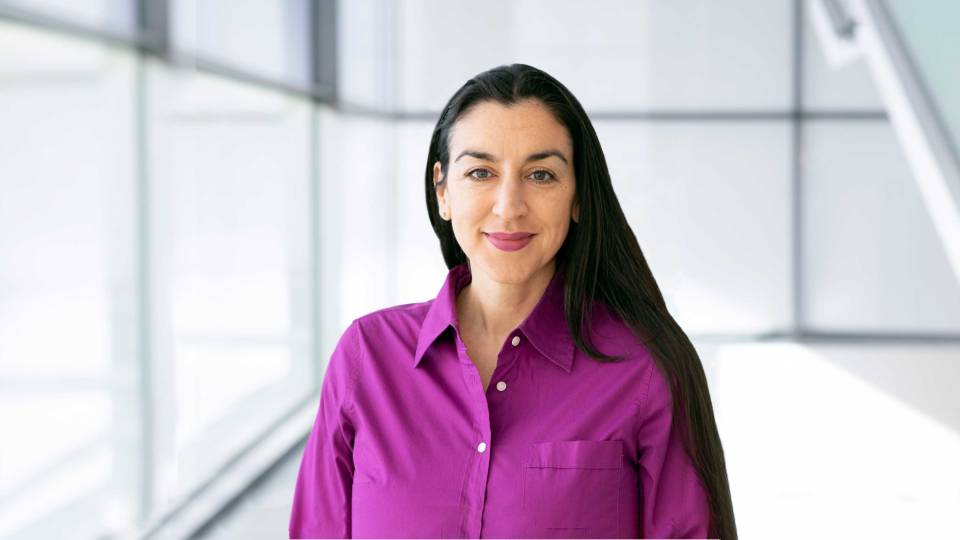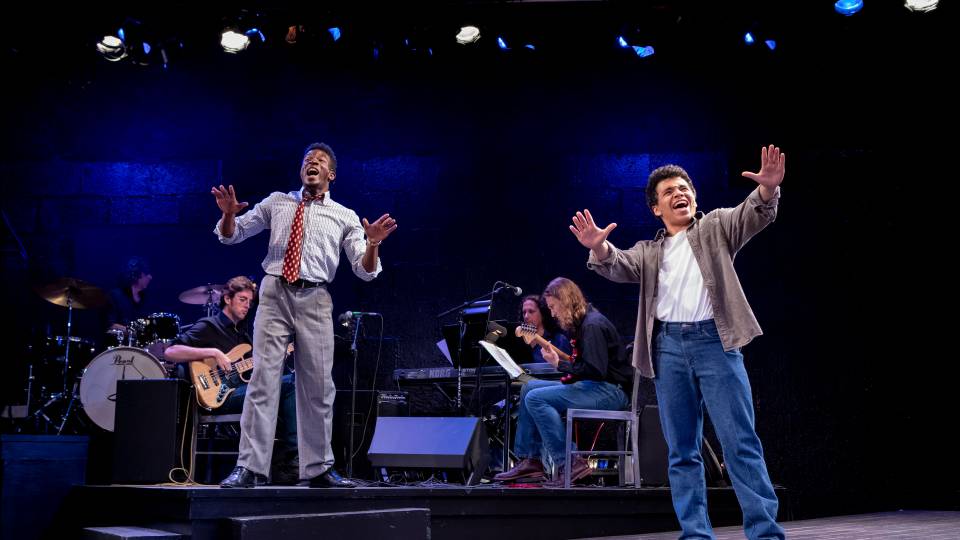From the May 16, 2005, Princeton Weekly Bulletin
Professor Tamsen Wolff switched on the CD player in her classroom in McCosh Hall and pressed “play.” The chattering among the 70 students abruptly stopped as music filled the room.
The tune was composed by one of the titans of musical theater, Stephen Sondheim, for his controversial 1990 show “Assassins,” which chronicles the lives of nine men who assassinated or tried to assassinate presidents of the United States.
The song, “How I Saved Roosevelt,” is about the assassination attempt on Franklin D. Roosevelt by Giuseppe Zangara. It features bystanders recounting how their actions saved the president:
“We’re crowded up close,
And I see this guy,
He’s squeezing by,
I catch his eye,
I say to him, ‘Where do you
Think you’re trying to go, boy?
Whoa, boy!’
I say, ‘Listen, you runt,
You’re not pulling that stunt,
No gentleman pushes their way to the front.’
I say, ‘Move to the back!’,
which he does with a grunt —
Which is how I saved Roosevelt!”
As the music crescendoed, the students followed along in their librettos. At several points Zangara, an Italian immigrant, interjects comments into the piece. Wolff asked the class to pay attention to the way that Sondheim puts quintessentially American music into the mouths of outsiders.
“You think that I scare?
No scare.
You think that I care?
No care.
I look at the world —
No good. No fair. Nowhere.”
The class, called “Topics in Drama: The Curious Aesthetics of Musical Theater,” investigates the unique conventions of form and narrative in musicals. A 300-level English course, it has been popular with students.
“There is very little good critical work on musicals,” said Wolff, an assistant professor of English. “People love them passionately but they don’t think about them critically, and musicals are not taken seriously. They are scorned as a cheesy, second-rate art form. But I think if there’s anything a liberal arts education should do for you, it is to let you be articulate and critical about what you’re passionate about.”
The class focuses on post-World War II musicals in the United States, including legendary shows such as “South Pacific,” “Oklahoma!”, “Sweeney Todd” and “West Side Story,” as well as more recent hits such as “Rent” and “Caroline, or Change.” The students also study the operas “The Mikado” and “Threepenny Opera.” They read the librettos, listen to the scores and view films of the shows that were made into movies.
“The musical is one of America’s greatest and most distinctive art forms, and certainly the one that has reached the widest audience,” said Claudia Johnson, chair of the English department. “I don’t know anyone who can’t sing dozens of songs from their favorite shows and who won’t admit sooner or later that such songs have a lot to do with how we have come to feel about important things, especially about love.
“We’re tremendously happy that Tamsen has developed this fabulous course on musical theater, which invites students to take the subject and the phenomenon seriously, to study the cultural contexts, the theatrical traditions and, of course, the words, music and dance that make it what it is.”
The class examines the musical’s efforts to integrate song, dance and dramatic action, and looks at why musicals are so popular. Students who took the course this past semester said that they have discovered layers of meaning in the musicals they did not expect to find.
“What I’ve really enjoyed about the class is learning to see beyond the fluffiness that most people consider musicals to be, to see that they have dark undercurrents and political themes that I think most people attribute to straight plays,” said Rodney Deavault, a member of the class of 2007.
In “Oklahoma!,” for example, Wolff recounts how the surface story is about celebrating the creation of a new American state, but the real story is about the violent costs of that formation.
“I didn’t know a lot about the historical and social aspects that musicals try and get across, the ideas about race and class,” said rising junior Jessica Gutierrez. “I never realized that was a major function of the shows.”
Most of the students in the class share a love of musical theater that dates back many years, and a handful have musical training. But they are a varied bunch, majoring in engineering, art history and Near Eastern studies.
“I love musicals — I did a ton of musical theater in high school,” said rising sophomore Jessica Harrop. “A lot of people, like my grandparents, think musicals are not sophisticated. This class makes you see them as an art form.”
Wolff has loved musicals since she was a child.
“‘My Fair Lady’ is my favorite,” said Wolff, who was cast as Henry Higgins — “maybe the best part I ever got to play” — at the age of 9.
A member of the Princeton faculty since 2001, Wolff has a bachelor’s degree in theater and women’s studies from Smith College and a Ph.D. in English and theater from Columbia University. She has written journal articles about modern and contemporary drama and performance, and is working on a book titled “Mendel’s Theatre: Performance, Eugenics and Early 20th-Century American Drama.” She also has directed several plays, including two by Jane Anderson, “A Night Call” and “Smart Choices,” which were performed at McCarter Theatre.
A few years ago Wolff was inspired to create the course by, of all things, an episode of the television show “Buffy the Vampire Slayer.”
“The show portrayed musical theater as a demon that possesses you and forces you to sing,” she said. “The writer, Joss Whedon, had come up with a reason for everybody to break into song. And the fact that musical theater is a demon, a kind of contagion, was also particularly interesting to me. I started thinking about the fact that musical theater doesn’t get the kind of critical attention it deserves.”
In class, Wolff has delved into the backgrounds of the shows’ authors and into issues that arise when producing a Broadway show. Composer and lyricist Adam Guettel visited the class as a guest lecturer to talk about his work, which includes the shows “Floyd Collins” and “The Light in the Piazza,” and to give a workshop on the process of creating a musical. Wolff’s students also attended a performance of “The Light in the Piazza,” which opened at Lincoln Center this spring.
The course requires two essays analyzing musicals the students have studied and a final paper that creates an outline and a critical justification for a new musical.
David Mesrobian, a member of the class of 2005 who majored in Near Eastern studies, is a former president of the Triangle Club. He said the class taught him about the evolution of musical theater.
“It’s interesting to see how ‘Threepenny Opera’ influences what’s popular in musical theater today,” he said. “We’ve had a lot of good discussions in precept about the underlying issues in the shows — the motivations of the authors, and the way Jewish theory and queer theory have come into play in the shows.”
Jessica Woods, a rising junior who describes herself as having an intimate knowledge of musical theater since childhood, said, “The cultural absurdity of musicals is such a delight.”
The class has inspired Woods to contemplate pursuing an independent concentration so she can examine musicals further. “I love that the intersection of social, cultural and political forces ends up — in a bizarre and delightful way — on the stage,” she said.






